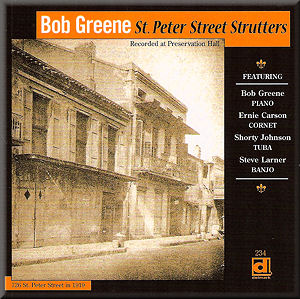1. St. Peter Street Strut
2. Winin' Boy Blues
3. The Pearls
4. Wolverine Blues
5. Snake Rag
6. Just a Closer Walk With Thee
7. Some of These Days
8. After You've Gone
9. Dr. Jazz
10. Kansas City Stomp
11. Mr. Jelly Lord
12. Angry
13. Sweet Substitute
14. Tiger Rag
15. Atlanta Blues
Bob Greene - Piano
Ernie Carson - Cornet
Shorty Johnson - Tuba
Steve Larner - Banjo
If you want to visit New Orleans but can't afford the fare, just
buy this CD. It exudes the spirit of the Big Easy and its venerable
venue, Preservation Hall. This album was recorded at Preservation
Hall in 1964 and is here released on CD for the first time. It was
perhaps unusual back then to find a quartet playing New Orleans jazz,
because the normal line-up consisted of trumpet (or cornet), clarinet,
trombone and rhythm section. Yet the four men here manage to sound
like a full seven-piece ensemble - even, at times, like a big band.
The album opens in typical New Orleans style with St Peter Street
Strut, which has the rather dislocated rhythm that makes you think
of a procession of people carrying umbrellas or parasols. Jelly Roll
Morton's Winin' Boy Blues follows, with pianist Bob Greene
soloing on piano in a characteristically Morton manner. Bob was clearly
influenced by Jelly Roll Morton - both in his piano style and the
choice of tunes, as six of the compositions are by Morton. Indeed,
Greene went on to form The World of Jelly Roll Morton, a tribute band
which toured the USA, Britain and South America for 13 years from
1969. The devotion to Morton's music is evident in performances of
such enduring numbers as The Pearls and Sweet Substitute.
Cornettist Ernie Carson is a remarkable player: providing a powerful
lead but also capable of tender lyricism in his solos on such tunes
as W. C. Handy's Atlanta Blues. His solos on faster numbers
like Angry may well remind you of Bix Beiderbecke in their
judicious choice of notes and eloquent phrasing.
Tracks 6 to 9 and 15 have not been issued before. Some of These
Days has masterly cornet from Ernie Carson and a banjo solo which
is almost obscured by the tuba. I am sometimes uncomfortable with
the tuba as the foundation of a rhythm section, as it can tie the
music down to earth in such a way as to become stodgy. But tuba-player
Shorty Johnson generally lifts the band instead of lowering it, and
he is well balanced by banjoist Steve Larner.
The upright piano at Preservation Hall is somewhat tinny but Bob
Greene surmounts its challenges, although it makes After You've
Gone sound rather honky-tonk. Being a Preservation Hall session,
you might expect the music to be rather rough-and-ready, but the quartet
supplies a high standard of musicianship as well as some delicate
touches. For example, the pianist starts Tiger Rag with an
almost childlike touch, and the track ends not with a loud climax
but in comparative calm.
Sometimes sessions like this get by on sheer nostalgia or even primitivism
but this recording is one that the musicians can rightly feel proud
of.
Tony Augarde
